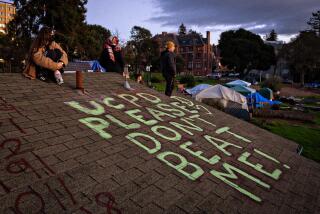Solar-Heating Suit Ruling Allows Bank to Foreclose
- Share via
In a decision that allows foreclosures against more than 100 homeowners allegedly defrauded by solar-heating contractors, an Orange County Superior Court judge ruled Tuesday that a bank is not responsible for the contractors’ sales tactics.
The decision clears the way for Central Bank of Oakland to proceed with 109 foreclosures in Los Angeles, Orange and Riverside counties against homeowners who claim that they were tricked into buying solar units that often did not work.
The homeowners typically took out second mortgages to finance their purchases and now could face forced sales of their homes in as little as 20 days. Representatives of the bank said Tuesday afternoon, however, that they were not certain whether the foreclosures would be pursued immediately.
“It’s premature to make a public statement, as we have not seen the decision,” said Central Bank lawyer Stanley A. Doten.
The ruling, in a lawsuit filed by the Public Interest Homeowners Assn. Inc., was handed down by Superior Court Judge Everett W. Dickey, who refused to issue a preliminary injunction against the bank to block the threatened foreclosures.
The decision applies to the bank alone and does not restrict separate claims against the solar contractors.
“The decision only applies to Central Bank, but they are involved in 50% of the 432 fraud cases we’re representing,” said homeowners association spokesman Joe B. Morgan.
An appeal of Dickey’s decision is “one of our options,” Morgan said.
If need be, 80 to 85% of the homeowners involved should have no trouble bringing their loans current, Morgan said, because they have made the equivalent of monthly payments--averaging about $150--into a special trust fund. That fund now contains about $51,000.
More Than 80 Defendants
The lawsuit was filed against more than 80 solar firms, banks and other financial institutions last year. But Central Bank was singled out as the only financial institution that was actively pursuing foreclosures, according to Arnold H. Dubrow, lawyer for the association, which was formed specifically to file the lawsuit.
Dubrow, who argued last month that Central Bank closely coordinated sales and loan tactics with solar firms, could not be reached for comment Tuesday.
Despite the fact that homeowners “appear to have legitimate grievances” against “sellers and contractors” of the devices, banks and other regulated financial organizations were legally not involved, Dickey ruled.
Dubrow claimed that homeowners were induced to purchase solar-heating devices through fraudulent misrepresentations about their efficiency and reliability, misleading assurances of substantial tax breaks and false promises of bonuses and prizes.
Many purchasers claimed that they did not realize that their homes could be seized for non-payment.
Dickey’s decision should have no effect on three other lawsuits, in San Diego, Fresno and Sonoma, brought by the state attorney general’s office against dozens of other solar firms and financial institutions.
“It doesn’t hurt any of our cases,” said John C. Porter, a supervising deputy attorney general in San Francisco.
Seminar by Bank Official
Last month, Dickey listened to arguments based on a transcript of a seminar given by a Central Bank vice president to salespeople for Dynasty Solar, also a defendant in the lawsuit.
On that tape, an officer identified as Vice President Walter Boom urged Dynasty sales representatives to order installation before unwary homeowners had a chance to exercise their legal right to cancel a purchase.
The high-pressure sales practice--known as “spiking”--was designed to make the buyer “feel committed” to the deal, even though California’s Unruh Act allows a homeowner three days to cancel after signing an installment sales contract.
Along with the Contractors State License Board, the attorney general’s office has conducted investigations over the last year from San Diego to San Francisco. State officials last year estimated that scope of the fraud to be “enormous,” noting that 1,500 firms were engaged in producing or selling solar heating products.
The homeowners did win a partial victory from Dickey on Tuesday. He ruled that the association may represent them in court, a decision strongly contested by the bank.
Doten said the bank was pleased with the ruling. “It has been our position that the financing through the Central Bank loan is separate from the purchase of the solar unit. If homeowners have complaints against contractors, that doesn’t allow them to refuse to pay on the bank loans.”
More to Read
Inside the business of entertainment
The Wide Shot brings you news, analysis and insights on everything from streaming wars to production — and what it all means for the future.
You may occasionally receive promotional content from the Los Angeles Times.










